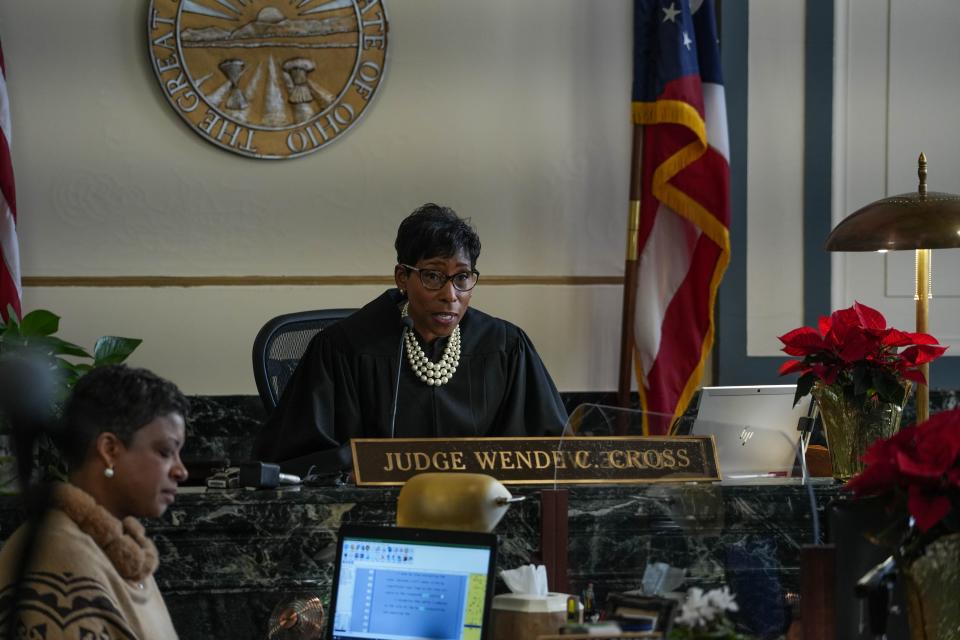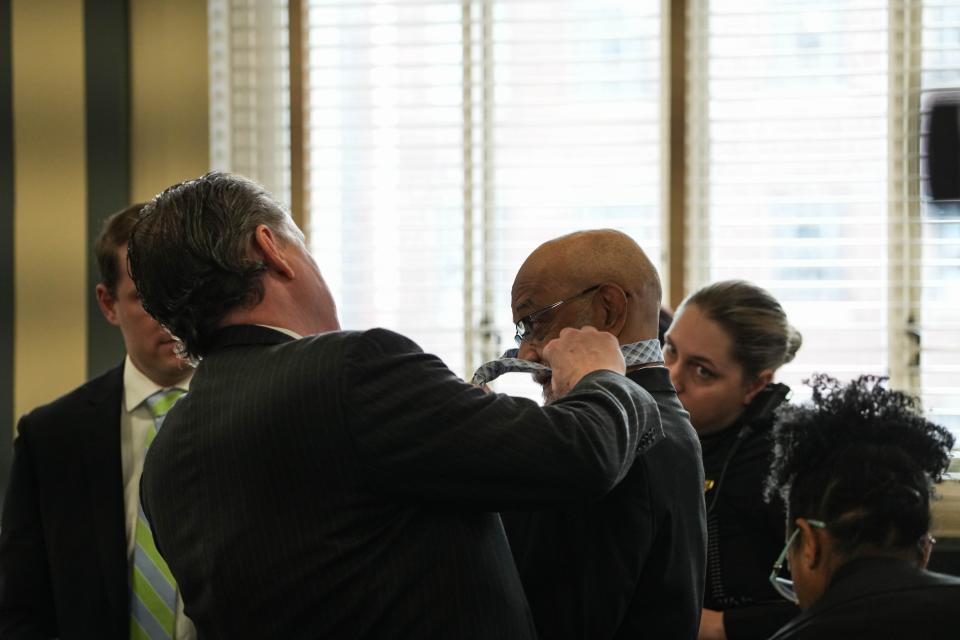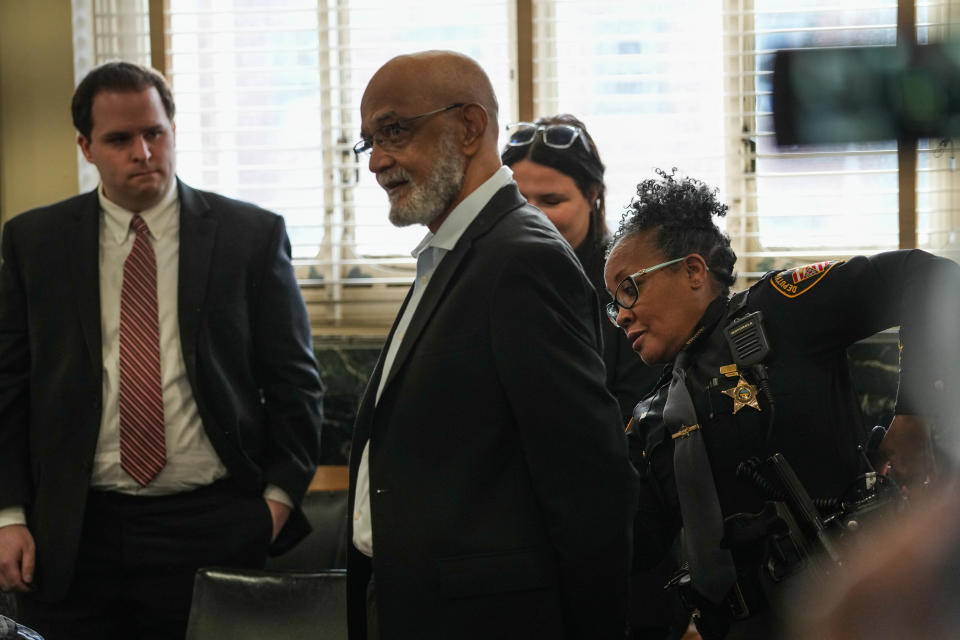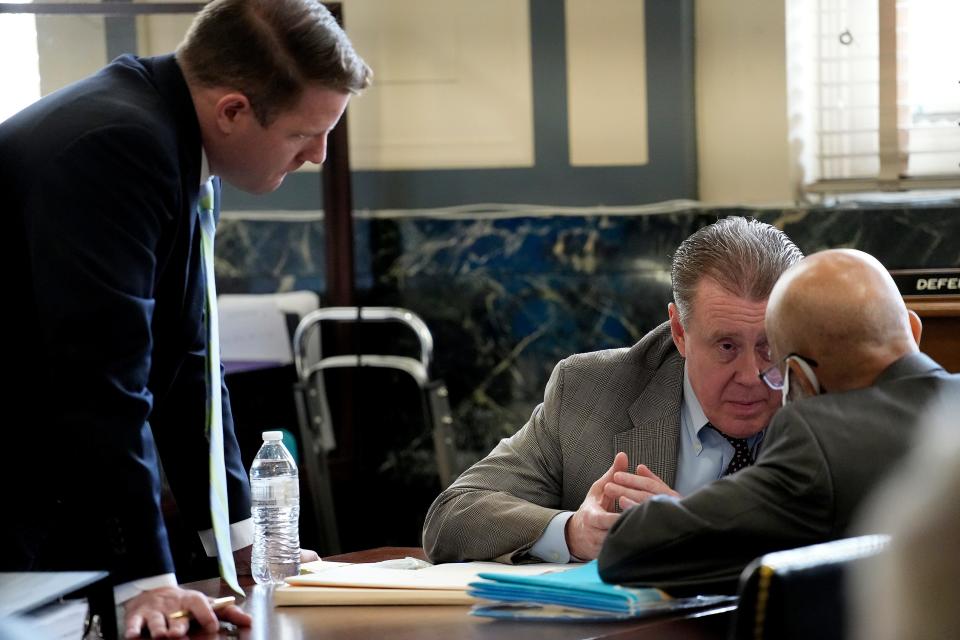Death-row inmate, subject of 'Accused' podcast, granted new trial
An Ohio man awaiting execution for a murder he maintains he didn't commit was denied a fair trial nearly 30 years ago by Hamilton County prosecutors, a judge ruled Tuesday.
Judge Wende Cross ordered a new trial for Elwood Jones, whose conviction was reinvestigated by Enquirer journalists in the fourth season of "Accused," the newspaper's award-winning true-crime podcast. The ruling was the outcome of a dramatic and rare three-day court hearing held before Cross in late August. Jones' lawyers argued that prosecutors withheld potentially exculpatory evidence from Jones’ original defense team before his murder trial in 1996.
Cross said Tuesday the undisclosed evidence undermined the jury’s verdict and reinforced "a win-at-all-cost mentality that undermines the pursuit of justice."
“It is clear the failure to disclose the existence of relevant exculpatory and impeaching evidence prior to trial deprived Elwood Jones of a fair trial,” Cross said. “The Sixth Amendment requires a new trial as the only appropriate remedy.”

She added that she knew her ruling would upset some.
"But my job is to not take into account any of that," she said. "My job requires that I have the courage to do what is right, regardless of the pressures of public opinion, political considerations or anything else."
Hamilton County Prosecutor Joe Deters said he plans to appeal Cross' ruling and then assess whether to retry Jones for murder.
Ruling underscores inaccuracies highlighted in 'Accused'
The case centered on the Sept. 3, 1994, beating death of Rhoda Nathan, a New Jersey grandmother killed in her Blue Ash hotel room after coming to the region for her best friend's grandson's bar mitzvah. The most recent season of "Accused" highlighted inaccuracies presented in the original trial, as well as investigative paths Blue Ash investigators and Hamilton County prosecutors did not pursue.

Cross' Tuesday ruling underscored many of the same matters, namely:
While prosecutors focused on an Eikenella corrodens infection in Jones' hand as proof he had punched Nathan in the mouth during a fatal assault, Cross said that evidence was undermined by the fact Nathan had an active Hepatitis B infection at the time of her death. That infection wasn't disclosed to Jones' defense team even though it was significant enough to police and prosecutors that they had Jones tested for the virus without explaining why. Cross noted that an expert witness during the August hearing said that if Jones had punched Nathan hard enough to get dental plaque in his hand, he would have likely also been infected with Hepatitis B. As of May 2022, testing on Jones indicated he has never been infected with the virus, which, according to Cross, makes the state's theory of the crime "scientifically implausible."
Information allegedly provided to Blue Ash Police about another man's supposed confession to the crime was not shared with Jones' original defense team. In August, Delores Suggs testified that before Jones' trial began in 1996, she had called Blue Ash police to tell them that she'd met a woman in the county jail who said her husband had killed a woman in the Embassy Suites and framed a Black man for the crime. Suggs said the officer with whom she spoke dismissed her concern, telling her they already knew the killer in the case.
A pendant reportedly found in Jones' trunk that belonged to Nathan was described in closing arguments by Assistant Prosecuting Attorney Mark Piepmeier as a unique, custom-made piece of jewelry akin to Nathan leaving her fingerprint with Jones. Jones' lawyers, however, turned up documentation that showed Nathan's family had said the necklace was a ready-made piece bought in a store.
The August hearing was a hail Mary effort by Jones’ lawyers after years of failed appeals. To underscore the number of documents prosecutors failed to share with the defense, Jones' team − led by lawyers Jay Clark and David Hine, working pro bono − filled seven thick binders with more than 4,000 pages that hadn't originally been turned over.
Prosecutors argued much of the information in the binders had been released piecemeal over the years and litigated in federal court through various appeals efforts. The August hearing was the first time the evidence was laid out comprehensively, however.

"I don't know if it's appropriate, but I'm going to thank the judge," Hine said after the hearing. "She could have had a knee-jerk reaction one way or the other. She could have bent to whatever external pressures there were, but to get that kind of a thorough decision ... It's just magnificent."
Clark said: "You can't get a day better than this."

Prosecutors maintain Jones is guilty
Prosecuting attorneys Seth Tieger and Philip Cummings left the courtroom without commenting to reporters. Deters didn't immediately offer comment, though he did appear on WLW-AM (700) and said the ruling was "offensive" and "ridiculous."
"I hope the judge enjoyed all the cheers in court today to let a killer free," said Deters, who has repeatedly called Jones a "murderous bastard" who would kill again if released from prison. Piepmeier had called Jones an “asshole” on the TV show Forensic Files in the 1990s. Asked if he stood by that character assessment when interviewed for the "Accused" podcast in 2019, Piepmeier modified the description to “f---ing asshole.”
Hines and Clark said neither description fits Jones.
"Elwood can come stay at my house if he wants," Clark said. Added Hine: "He can babysit my kids."
Jones, who’d had legal run-ins with prosecutors long before the 1994 slaying, said the office focused on him for personal reasons. In a recent message sent from behind bars, Jones said that prosecutors “have elected to overlook or disregard the facts in this case” and “are simply making personal attacks towards me … resorting to character assassination and name calling.”
Jones attended Tuesday's hearing wearing a tie that Clark helped him knot and dress shoes that were removed after the ruling was announced. Jones then put on a pair of jail-issued slippers and was escorted to the county jail, where he's to await a status conference in the case scheduled for Jan. 12.

Before reaching her decision, Cross had already filed one ruling in favor of Jones. She agreed that hairs collected from the crime scene should be tested for DNA. It's unclear what that testing could uncover. Because the crime scene was a hotel room and because multiple people trampled through the room as efforts were made to save Nathan's life, the forensic evidence gathered there has long been considered of questionable value.
Jurors convicted Jones in late 1996, then sentenced him to die in early 1997, and he's been on death row ever since. His execution date has been repeatedly postponed because of his appeals and, more recently, the COVID pandemic.
In a late afternoon news conference, Deters said Cross was wrong in her opinion, saying a federal court found the Hepatitis B test results had been turned over to the defense and the family on Tuesday said the pendant was custom-made.
Deters acknowledged that there were mistakes made. He said that happens in every case. Defendants, he said, are guaranteed a fair trial, “not a perfect trial.” Deters said that rulings such as Cross' underscore the importance of local elections.
"Now, are people going to pay attention to who they elect as judges?" Deters said on WLW. "If you want to have a lawless society, just keep electing elected officials, prosecutors, judges that ignore the law, that look for any reason to not hold anybody responsible for their dastardly acts."
This article originally appeared on Cincinnati Enquirer: Elwood Jones, subject of 'Accused' podcast, granted new trial


